Research Safety Training
Learning Center Access
Undergraduates
Undergraduate researchers may need to request a 'Student' account to access the UC Learning Center.
Visiting Researchers
Visiting researchers and interns must first obtain a CruzID before requesting an 'Afiliate' account. The PI or LSR should request a 'Sponsored Account' before submitting a request for Learning Center access. Affiliate access guide.
Numerous biological, chemical, and physical hazards can be present when working at the cutting edge of research. It is for these reasons that training is a critical part of creating a safe working environment in the lab.
Laboratory safety training is required before starting work in a lab and when new hazards or processes are introduced. Training is required for Principle Investigators (PIs), UCSC graduate and post-doctoral researchers, visiting researchers, and any other personnel working in the laboratory. Training must include physical and health hazards in the work area, along with applicable exposure control measures.
In accordance with the UC Office of the President Lab Safety Training Policy, all researchers must complete approved comprehensive lab safety training every three years.
eCourse Registration
A step-by-step guide for navigating the registration process in the UC Learning Center can be found here: eCourse Registration Guide
Core Safety Courses
Every person working in a research lab must completed the following training courses before beginning work in the lab:
Laboratory Safety for Research Personnel 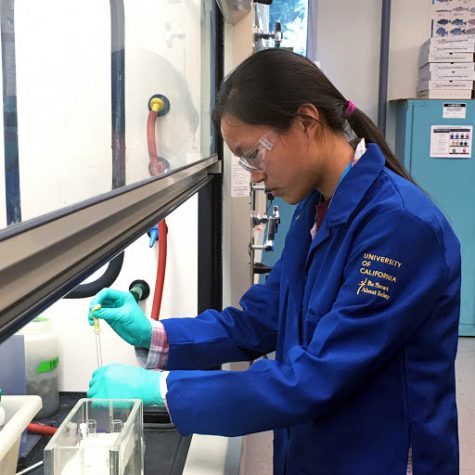
An introduction to the fundamentals of laboratory, chemical, and general safety. This course covers relevant campus laboratory safety manual resources and rights and responsibilities according to applicable regulations.
The course must be renewed every three years by retaking the initial Fundamentals course or completing the Refresher option.
Additional registration guidance can be found on this step-by-step guide.
Provides an overview of protective clothing and equipment for the body, eye and face, hands, and feet.
This training is provided through the online EH&S tools, and not through the Learning Center. Additional program details can be found on the Laboratory Hazard Assessment page.
In-Lab Orientation
Online courses can provide broad generalized safety information but they don't provide details on how a specific lab or space functions. Before beginning work new researchers should also complete a Lab-Specific Training Checklist with a more senior member of the group.
Biosafety Courses
Biosafety and Nucleic Acid Technologies
The initial Biosafety and Nucleic Acid Technologies class is REQUIRED for all researchers planning to use biological material, including recombinant DNA. This class is instructor-led and typically offered monthly. Register through the UC Learning Center, or contact the Biosafety Officer (biosafety@ucsc.edu) for more information.
The Bloodborne Pathogens training class is REQUIRED for all personnel handling human or non-human primate tissues, sera, cell cultures, or other materials. Initial and refresher Bloodborne Pathogens training can be taken online as an eCourse through the UC Learning Center, or as a special lab group training session arranged with the Biosafety Officer (biosafety@ucsc.edu). This class must be repeated annually.
Aerosol Transmissible Diseases
Animal Handling
Initial online course, followed by in-person training.
Required before using campus autoclaves. After completing the online eCourse consult with your lab's Lab Safety Representative (LSR), or facilities certified autoclave trainer, for unit-specific training. If your group does not have any approved trainers please reach out to facilities staff to initiate the process.
Radiation and Laser Safety Courses
Radiation Safety or laser safety training is REQUIRED for all personnel prior to using radioactive materials, radiation-producing machines, or class 3B and class 4 lasers. RUA Holders shall also take this training, regardless of whether they use radioactive materials, x-ray devices, or lasers themselves.
An Initial and an annual refresher training shall be taken, as required by the State of CA, Radiological Health Branch.
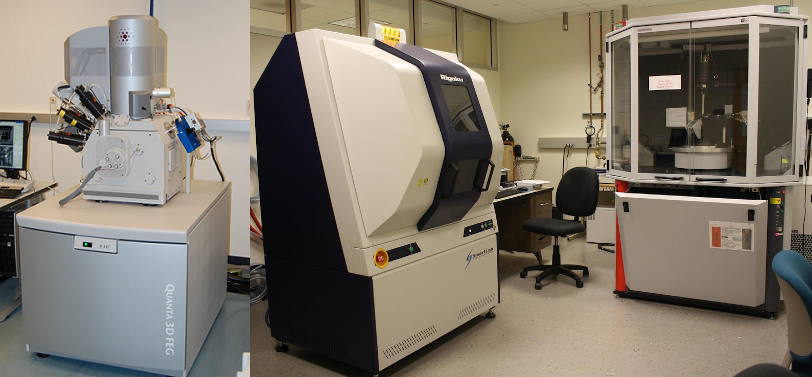
Left: FEI Quanta 3D FEG Dualbeam Microscope at the W.M. Keck Center for Nanoscale Optofluidics
Right: X-ray Facility, UC Santa Cruz Department of Chemistry and Biochemistry
Radiation Safety - Radiation Producing Machines
There is an initial training, and it is required for all users of x-ray diffraction or x-ray florescence, as well as the RUA holders of any x-ray department. An annual refresher is also required. Certified x-ray technicians are not required to take this training, as they will receive training elsewhere. Electron microscope users have a training sheet to read and sign. Please ask your supervisor for this.
Radiation Safety - Radioactive Materials 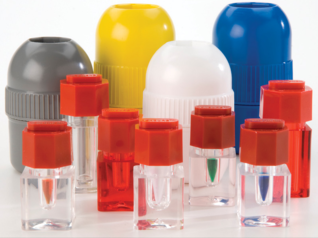
There is an initial training, and it is required for all users of radioactive materials prior to use. An annual refresher is also required.
Radiation Safety - Radioactive Materials and Radiation Producing Machines
This is an initial training, and it is required for all users who plan to use both radioactive materials and x-ray diffraction, or x-ray florescence. For those who take this training, two annual refreshers are needed, one for radioactive materials and one for radiation producing machines.
This is an initial training for anyone entering a lab or space that contains radioactive material, or anyone who may come in contact with radioactive packages. This training can be read, signed, and dated, scheduled live, or attended remotely with the Radiation Safety Officer. An annual refresher is required for access to radioactive material labs.
Laser Safety training is REQUIRED for all personnel working with Class 3 or 4 lasers. PIs of laser labs shall also take this training even if they do not use the laser. An annual refresher is required for laser users and PIs supervising laser use.
Laser Safety Awareness is required for anyone entering a laser lab for any reason other than using the laser. Live or zoom trainings can be scheduled with the Radiation Safety Officer.
Chemical Specific Safety Courses
Introduction to the secure use of controlled substances at UCSC. This course must be completed before beginning working with or handling controlled substances.
Formaldehyde/Formalin Safety Training
This course provides an overview on the safe handling and use of formaldehyde. It includes a review of formaldehyde's physical properties, health effects and hazards from exposure, and the common routes of exposure, along with the workplace controls, best practices, and first aid procedures for working safely with formaldehyde.
Any researchers who plan to conduct work with formaldehyde should complete this training.
Training is provided on an as needed basis, please contact EHS, ehs@ucsc.edu, or the Chemical Hygiene Officer, Terra Haddad, thaddad@ucsc.edu to schedule a training session.
Hydrofluoric Acid Safety Training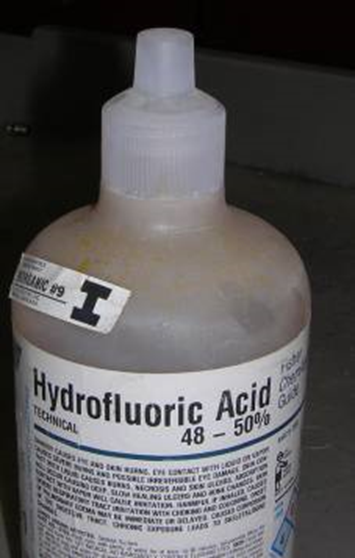
This course provides an overview on the safe handling and use of hydrofluoric acid. It includes a review of hydrofluoric acid's physical properties, the hazards and health effects associated with hydrofluoric acid, and the common routes of exposure. The workplace controls, best practices, and first aid procedures for working safely with hydrofluoric acid are also detailed in this course.
Any researchers who plan to conduct work with hydrofluoric acid should complete this training. Additionally, it is advised that any other researchers working in the same lab, where hydrofluoric acid is being used, complete the training to be made aware of the hazards associated with hydrofluoric acid.
HF training is provided on an as needed basis, please contact EHS, ehs@ucsc.edu, or the Chemical Hygiene Officer, Terra Haddad, thaddad@ucsc.edu to schedule a training session.
Pyrophoric Reagents Safety Training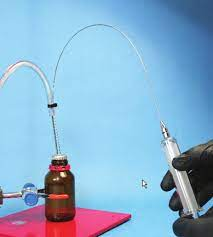
There are two courses available providing an overview of the safe handling and use of pyrophoric reagents. The eCourse entitled, "Pyrophoric Liquid Safety 1.1", provides an overview of pyrophoric liquid safety for researchers who will be working with pyrophoric or water-reactive materials, including a description of the use of gloves for working with these types of reagents.
Any researchers who plan to conduct work with pyrophoric materials or in an area where pyrophoric materials are handled should complete this online training.
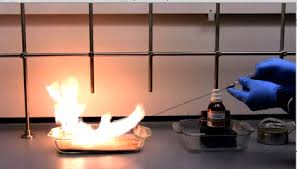 Additionally, an instructor-led discussion and training is offered, where the physical properties, hazards and health effects, and common routes of exposure, along with the workplace controls, best practices, and first aid procedures for working safely with pyrophoric reagents are presented and discussed.
Additionally, an instructor-led discussion and training is offered, where the physical properties, hazards and health effects, and common routes of exposure, along with the workplace controls, best practices, and first aid procedures for working safely with pyrophoric reagents are presented and discussed.
This is a forum for researchers to discuss concerns and thoughts regarding working with these reagents. This is an optional training, which is scheduled as needed, please contact EHS, ehs@ucsc.edu, or the Chemical Hygiene Officer, Terra Haddad, thaddad@ucsc.edu to schedule a training session.
Other Safety Courses
This course provides an overview for the safe use and storage of cryogenic materials. The topics covered include physical properties of cryogens, hazards of working with cryogens, safe handling practices, and proper PPE.
Any researchers who plan to use cryogens should complete this training. Researchers working in proximity to cryogens should also complete this training for general awareness purposes.
The information sheets below can also be used as quick references for working with dry ice and liquid nitrogen:
Safely Working With Liquid Nitrogen
This course is comprised of a series of videos from Jim Gilson, Senior Safety Engineer from UC Berkeley. The topic covered in the course include basics of electricity, generation and distribution of electricity, different types of common electrical equipment, resistance, and electrical hazards.
The videos on electrical hazards include discussion of electric shock, electrocution, and arc flash. There are also sections that discuss personal protective equipment specific to working with electricity and other safety equipment commonly used in electrical work such as Ground Fault Circuit Interrupters (GFCI). Finally the course covers safe work practices such as Lock Out Tag Out (LOTO) procedures and awareness of stored charges.
Hazardous Materials Shipping (General Awareness)
